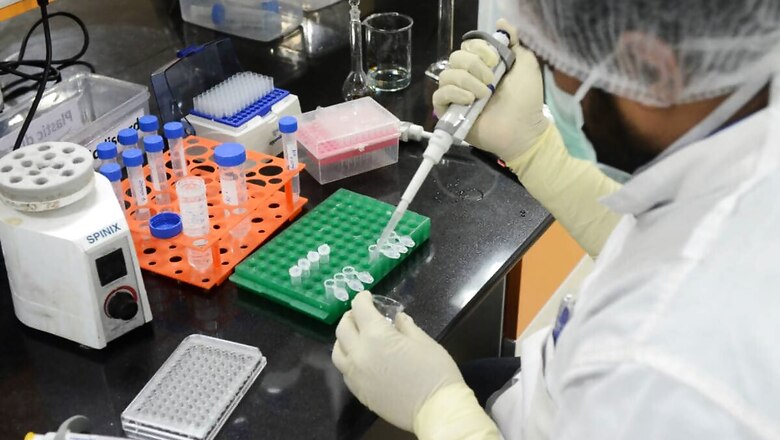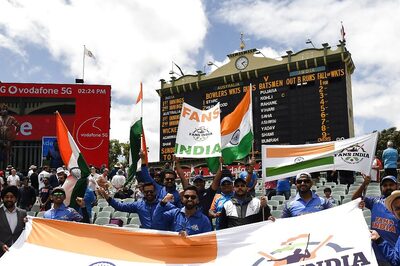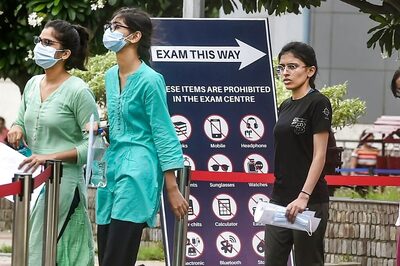
views
On 22 February, results of a research led by Public Health Scotland showed that by the fourth week after receiving the initial dose, the Pfizer and Oxford-AstraZeneca vaccines reduced the risk of hospitalization from Covid-19 in up to 85% and 94% respectively, with those over 80 years showing an 81% reduction.
The research was part of the EAVE II project that looked at patient data to track the pandemic and the vaccine roll out in real time. The study, involving the Universities of Edinburgh, Strathclyde, Glasgow, Aberdeen and St Andrew’s. The population studied had received 1.14 million doses during the study period between 8-15 December 2020.
This is by far the most direct evidence of effectiveness of quick COVID vaccination.
Other recent data from Israel Pfizer/BioNTech vaccine showed 75% reduction in risk of Covid-19 infection by single dose. Two weeks after receiving both doses, vaccinated Israelis were found to be 95.8% less likely to fall ill and 98.9% less likely to face hospitalisation and death. Nearly 1.7 million people have received both doses in Israel.
This builds a case for quick community penetration of vaccination programme.
Also read: Fresh Covid-19 Cluster Detected in Bengaluru Apartment Complex With 10 Cases, Civic Body Warns of Lockdown
India crossed the proud 1 crore vaccination mark on February 19. We are inoculating over 4 lakh people everyday. At the current rate of vaccination and our large population, it may take us around 10 years to build herd immunity through vaccination.
Most of the current vaccination drive in India is being carried out by the government, save the private sector healthcare employees, who have been vaccinated by their respective private hospitals. India has prepared a priority list for vaccination. The first group to receive vaccination is the frontline workers starting with healthcare workers. Next in line would be people over 50, and those under 50 with health conditions that make them vulnerable.
Recently, the private sector has offered to participate in this vaccination drive. A case has been made out by Wipro Chairman Azeem Premji that involving private sector could push the vaccination numbers in a big way.
There’s no doubt that a quick vaccination drive would be helpful in working towards herd immunity. In a country like India where we have a hybrid healthcare system, involvement of private sector is a matter of when, not if. However this has to be carefully planned and delivered.
The aim of private sector involvement should be supplementing and augmenting capacity and not delegating or shifting responsibility for vaccination. There should be a public-private partnership vaccination programme led by the public sector.
What are other countries doing?
In the US, a hybrid vaccination is happening with federal and state governments, and private hospitals carrying out vaccination drives. However, there is tight monitoring and violation leads to hefty fines, even curtailing of their next vaccination cluster.
In the UK, mostly the government sector is at play.
Also read: Curfews, Screenings & Travel Advisory: States on High Alert as India Sees Biggest Covid-19 Jump Since Nov
If India were to go the US way for hybrid public and private vaccination clinics, there has to be stringent criteria of do’s and don’ts and close monitoring on daily basis.
This is important because we are already short of vaccine supplies everywhere in the world and any wastage or out of place delivery or queue-skipping could push the objective further away.
However, this does not mean that there’re no such issues with current vaccination happening only through government sector. There have been unconfirmed reports of vaccine finding backchannels entering into private hands and being sold for a larger amount. Wastage is also a big issue.
Roadmap required
The private sector would have to ensure that the vaccine gets real penetration into the community and not just few privileged. A clear roadmap is required.
The next angle is supply chain. The government would have to create pathways for supply chain preferably through common delivery pathways to both sectors to keep the numbers in unison. What share of vaccine supply chain goes to private and what to public distribution would need to be ascertained.
Monitoring of vaccine side effects or failures would also need to be streamlined between sectors.
A proposal to purchase vaccines at Rs 300 a dose and adding Rs 100 as administration cost has been suggested. Whether this Rs 100 cost would be acceptable to all the private players or whether this would vary from hospital to hospital needs to be seen, more so when some hospitals might need to send teams to remote areas for vaccination.
If the private sector just wants to vaccinate the people who walk in through their door, this might create uneven vaccination patterns difficult to monitor and analyse in any community.
There would need to be a synchronised data gathering on how and how many vaccinations are happening in each block or district or village.
Which vaccine would be accessible to the private players is also to be discussed. With Sputnik V and other vaccines also coming to India, there would be choices. We don’t have any data yet on mix and match vaccinations at this time, though a study is underway in the UK as we speak.
A universal vaccine card would be needed so there can be crossover between public and private players for the second dose if required.
The public sector would need to show leadership and private sector, transparency. It’s how we do this will be more important than when we do it.
Read all the Latest News, Breaking News and Coronavirus News here


















Comments
0 comment